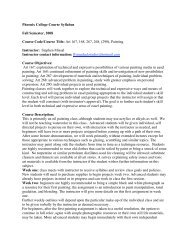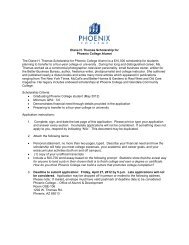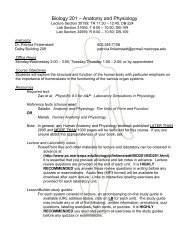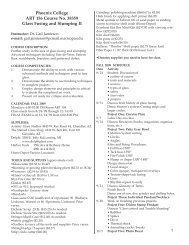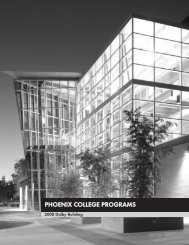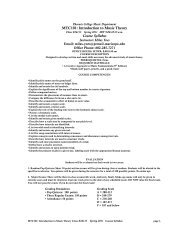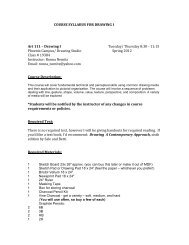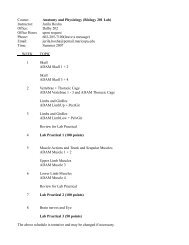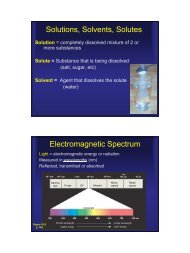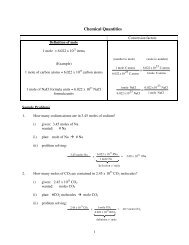Phoenix College Catalog 2009-10
Phoenix College Catalog 2009-10
Phoenix College Catalog 2009-10
You also want an ePaper? Increase the reach of your titles
YUMPU automatically turns print PDFs into web optimized ePapers that Google loves.
282 | <strong>Phoenix</strong> <strong>College</strong> <strong>2009</strong>–20<strong>10</strong> CATALOG<br />
Course Descriptions<br />
HCE152<br />
Laboratory Assisting: Principles and<br />
Procedures<br />
2 credit(s) 6 period(s) lecture + lab<br />
Principles and procedures for pre-analytical<br />
processing of laboratory specimens.<br />
Performance of specimen processing, preanalytical<br />
processes, and point-of-care<br />
testing. Application of quality assurance,<br />
quality control, infection control, and<br />
laboratory safety. Use of laboratory supplies,<br />
instrumentation, and information systems.<br />
Performing clerical and computer functions<br />
using medico-legal guidelines for<br />
documentation. Prerequisites or<br />
Corequisite: HCE150.<br />
HCE158<br />
Laboratory Assisting Practicum<br />
2 credit(s) 6 period(s) lab<br />
Practicum in laboratory assisting based in<br />
healthcare facilities or reference laboratories.<br />
Performance of clinical skills for preanalytical<br />
processing of laboratory<br />
specimens, initial testing phases, and pointof-care<br />
testing using laboratory<br />
instrumentation, information systems, and<br />
supplies. Application of quality assurance,<br />
quality control, infection control, and<br />
laboratory safety. Performance of clerical<br />
and computer functions using medico-legal<br />
guidelines for documentation. Use of<br />
professional and ethical conduct in all<br />
interpersonal communications.<br />
Prerequisites: HCE150 and HCE152 and<br />
permission of program director.<br />
HCE162<br />
Aseptic Techniques<br />
1 credit(s) 3 period(s) lecture + lab<br />
Fundamentals of microbial control. Includes<br />
procedures for sanitation, disinfection, and<br />
sterilization. Specimen collection and<br />
handling. Compliance with Occupational<br />
Health and Safety Administration (OSHA),<br />
the United States Center for Communicable<br />
Disease Control (CDC), and Clinical<br />
Laboratory Improvement Amendments<br />
(CLIA). Prerequisites: Acceptance into the<br />
Medical Assisting program or permission of<br />
Program Director. Corequisites: HCC130<br />
and (HCC145, or HCC145AA, HCC145AB,<br />
and HCC145AC), or permission of Program<br />
Director.<br />
HCE167<br />
Laboratory Testing in Patient Care<br />
Service Centers<br />
1 credit(s) 1.5 period(s) lecture + lab<br />
Basic Point of Care testing in a clinical<br />
setting. Includes procedures for urinalysis,<br />
whole blood hematology, glucose monitoring,<br />
cholesterol and coagulation testing.<br />
Specimen collection and handling.<br />
Compliance with Occupational Health and<br />
Safety Administration (OSHA) and the<br />
Clinical Laboratory Improvement<br />
Amendments (CLIA) regulations.<br />
Prerequisites: HCE162 and acceptance into<br />
the Medical Assisting program, or permission<br />
of Program Director. Corequisites: HCC130<br />
and (HCC145, or HCC145AA, HCC145AB,<br />
and HCC145AC), or permission of Program<br />
Director.<br />
HCE170<br />
Overview of Histology<br />
(Anatomic) Laboratory<br />
1 credit(s) 1 period(s) lecture<br />
Overview of anatomic laboratory services,<br />
anatomic laboratory professionals, and the<br />
role of the histology technician. Emphasis<br />
on certification, accreditation, and regulatory<br />
agencies. Application of process<br />
improvement, quality control, laboratory<br />
mathematics, infection control, sharps/<br />
mechanical hazards, documentation,<br />
medico-legal implications, and chemical<br />
hygiene principles. Includes information<br />
management in anatomic laboratories.<br />
Importance of management and supervision<br />
leadership principles and professional<br />
growth and ethical conduct. Prerequisites:<br />
Admission to Histologic Technology<br />
Program or permission of program director.<br />
Corequisites: HCE171 and HCE172.<br />
HCE171<br />
Chemistry of Fixation<br />
2 credit(s) 2 period(s) lecture<br />
Principles of fixation and fixative solutions.<br />
Anatomic laboratory instrumentation and<br />
specimen handling, identification, and<br />
tracking protocols. Emphasis on gross<br />
examination processes, tissue processing<br />
protocols, and specialized processing<br />
techniques. Prerequisites: Admission to<br />
Histologic Technology Program or permission<br />
of program director. Corequisites: HCE170<br />
and HCE172.<br />
HCE172<br />
Practicum: Chemistry of Fixation<br />
3 credit(s) 6 period(s) lab<br />
Practicum in histology techniques performed<br />
in an anatomic laboratory. Application of<br />
clinical skills for specimen handling,<br />
identification, and tracking protocols. Use of<br />
anatomic laboratory instrumentation. Study<br />
of gross examination protocols.<br />
Demonstration of fixation techniques,<br />
paraffin processing protocols, and specialized<br />
processing techniques. Performance of<br />
clerical and computer functions using<br />
medico-legal guidelines for documentation.<br />
Use of professional and ethical conduct in all<br />
interpersonal communications.<br />
Prerequisites: Admission to Histologic<br />
Technology Program or permission of<br />
program director. Corequisites: HCE170<br />
and HCE171.<br />
HCE173<br />
Microtomy<br />
3 credit(s) 3 period(s) lecture<br />
Emphasis on decalcification techniques,<br />
ergonomic safety practices for microtomy,<br />
and frozen section techniques. Application<br />
of embedding orientation by tissue type.<br />
Procedures for paraffin embedding station,<br />
cryostat and rotary microtome set-up and<br />
maintenance, and sharps safety practices<br />
for the microtome. Includes techniques for<br />
microtomy, specialized microtomy, frozen<br />
section, and cytology specimen preparation.<br />
Prerequisites: HCE172. Corequisites:<br />
HCE174.<br />
HCE174<br />
Practicum: Microtomy<br />
3 credit(s) 6 period(s) lab<br />
Practicum in histology techniques performed<br />
in an anatomic laboratory. Use of<br />
decalcification and frozen section techniques.<br />
Includes embedding orientation by tissue<br />
type and ergonomic safety practices for<br />
microtomy. Procedures for the paraffin<br />
embedding station, cryostat and rotary<br />
microtome set-up and maintenance, and<br />
sharps safety practices for the microtome.<br />
Emphasis on techniques for microtomy,<br />
specialized microtomy, frozen section, and<br />
cytology specimen preparation.<br />
Prerequisites: HCE172. Corequisites:<br />
HCE173.<br />
HCE175<br />
Cellular Biological Staining<br />
3 credit(s) 3 period(s) lecture<br />
Recognition of basic cellular structure.<br />
Identification of carbohydrates classification,<br />
pigments, minerals, and lipids in tissues and<br />
connective tissue structures. Explanation of<br />
chemical staining theory. Stain principles<br />
and procedures for nuclear and cytoplasmic<br />
structures, carbohydrates and lipids,<br />
connective tissue, and tissue pigments and<br />
minerals stains. Prerequisites: HCE173 and<br />
HCE174. Corequisites: HCE176.



